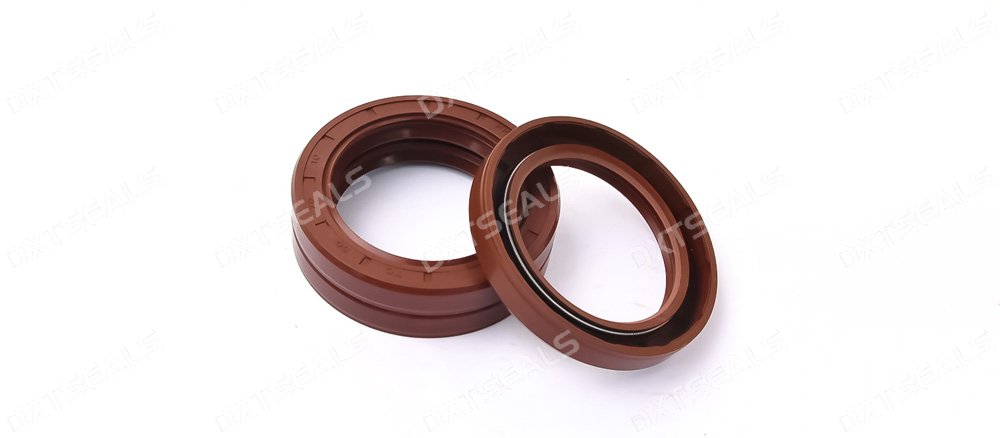
Introduction
TC oil seals, also known as dual-lip oil seals, are widely used in various industrial and automotive applications due to their robust design and superior sealing performance. In this article, we will discuss the key characteristics of TC oil seals and compare them to other types of oil seals, highlighting their advantages in sealing performance, durability, and versatility.
Key Characteristics of TC Oil Seals
1.Dual-Lip Design The most distinguishing feature of TC oil seals is their dual-lip design. TC oil seals are equipped with both a primary lip and a secondary dust lip. The primary lip provides excellent fluid retention, while the secondary lip prevents contaminants such as dirt, dust, and moisture from entering the system. This dual-lip structure enhances the overall sealing performance and protects the internal components from wear and tear.
2.Durability and Wear Resistance TC oil seals are made from high-quality materials like Nitrile Rubber (NBR) and Fluoroelastomer (FKM), which offer excellent resistance to wear, heat, and chemicals. This makes TC oil seals highly durable, allowing them to withstand the harsh operating conditions commonly found in industrial and automotive environments. Their durability ensures a longer service life, reducing the frequency of maintenance and replacements.
3.Superior Sealing Performance The dual-lip design, combined with the use of high-performance materials, provides TC oil seals with exceptional sealing capabilities. They can effectively prevent oil, grease, and other fluids from leaking, while also blocking external contaminants from entering the system. This high level of sealing performance makes TC oil seals suitable for applications where reliability is crucial.
4.Temperature and Chemical Resistance TC oil seals are designed to operate in a wide range of temperatures, making them versatile for different environments. NBR TC oil seals can withstand temperatures from -40°C to 100°C (-40°F to 212°F), while FKM TC oil seals can endure even higher temperatures, up to 200°C (392°F). Additionally, TC oil seals are resistant to various chemicals, oils, and fuels, ensuring their effectiveness in challenging industrial applications.
5.Versatility TC oil seals are highly versatile and can be used in a wide range of applications, including automotive engines, industrial machinery, pumps, and gearboxes. Their ability to function in diverse environments, along with their high-performance characteristics, makes them a popular choice in many industries.
Advantages of TC Oil Seals Compared to Other Types
1.Enhanced Contaminant Protection Compared to single-lip oil seals, TC oil seals provide superior protection against contaminants due to their dual-lip design. The secondary dust lip acts as an additional barrier, preventing dirt, debris, and moisture from entering the system, which is especially important in harsh or dusty environments. This is a key advantage over other types of oil seals, such as SC (single-lip) oil seals, which only offer basic fluid retention without additional dust protection.
2.Better Sealing Under Pressure TC oil seals are designed to perform well under both low and moderate pressure conditions. In contrast, some other oil seals, such as VB oil seals, are better suited for very high-pressure applications but may not provide the same dual-function protection against contaminants. The TC oil seal’s ability to handle both fluid retention and dust exclusion makes it a more versatile option for a wider range of applications.
3.Longer Service Life Due to the dual-lip design and use of durable materials, TC oil seals generally offer a longer service life than other types of oil seals. For example, single-lip oil seals may wear out more quickly due to their limited protection against external contaminants. The enhanced durability of TC oil seals leads to reduced maintenance and replacement costs, which is a significant advantage in applications where downtime can be costly.
4.Cost-Effective Solution While some oil seals, such as FKM or PTFE-based seals, may offer higher resistance to extreme conditions, they are often more expensive. TC oil seals provide a cost-effective solution that balances performance, durability, and price. For most general industrial applications, TC oil seals offer excellent value for money, making them a popular choice in sectors where both performance and cost-efficiency are essential.
Conclusion
TC oil seals offer numerous advantages over other types of oil seals, including enhanced protection against contaminants, superior sealing performance, and longer service life. Their dual-lip design, combined with durable materials, makes them highly effective in preventing fluid leakage and keeping dust and debris out of critical components. When comparing TC oil seals to other oil seal types, their versatility and cost-effectiveness stand out as key benefits, making them an excellent choice for a wide range of industrial and automotive applications.
Call to Action
Looking for high-quality TC oil seals for your machinery? Contact us today to find the perfect solution for your application and ensure long-lasting performance!
